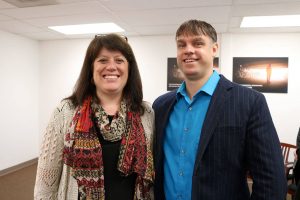“Congregations for the Homeless – Coping with the Pandemic!”
David Bowling
Executive Director Congregations for the Homeless (CFH)
Introduced by: Steve Roberts
Logged In =
Create =
Manage =

Our speaker David Bowling, Executive Director of Congregations for the Homeless (CFH), was introduced by BBRC member and prior CFH Executive Director Steve Roberts. The topic “Congregations for the Homeless – How are we Dealing with the COVID-19 Pandemic!”
David explained how Congregations for the Homeless strives to provide a path from homelessness to stable living for men on the Eastside. This work is based on their core values: Developing relationships, building respect and trust; Dignity and respect – showing compassion, kindness and grace; Community – collaboration, service and partnership on the part of the community; and Empowerment – supporting and encouraging men to take responsibility and ownership over their lives.
CFH programs include: Permanent housing; Shelter with services, Case Management; Mental Health assistance; and housing navigation and services. CFH is presently helping 300 men a year get into permanent housing and has 90 housing units. They serve between 1,500 to 2,000 people a year.
When COVID-19 hit, CFH quickly had to develop changes to their normal way of operating
- Developed a Crisis team and worked to keep everyone connected.
- Deepened their partnership with public health.
- Team member’s roles changed. Volunteers have not been able to cook and eat with the men like they had previously. That is the way to build relationships. That had to change. New protocols were developed. Staff members work from home while staying connected with calls and Zoom meetings.
- Program modifications were made to maintain communications since they could no longer meet face to face.
- The Rotating Shelter program, which is hosted by area congregations, shifted from an overnight shelter to being open 24/7, since the men could not work or look for work.
- Men at the Lincoln Center shelter who were considered most vulnerable were moved to a local motel to minimize the risks associated with COVID.
- Community involvement changes. With no volunteers donating meals (they would often cook with the men), we needed to enhance meal donations, establish new community relationships and overcome the challenge of connecting. The continuing challenge is making sure everyone is connected.
David shared a happy story. “Our chef at Lincoln Center (Bellevue), a chef with a lot of experience, started an apprentice program. With COVID-19, he got sick and had to be quarantined. His “apprentices” took over and managed the kitchen and really did a great job!”
CFH is now looking at establishing clubs to keep the men busy, thus creating community and programs in a COVID world. This involves creating new programs such as a landscaping and gardening club, the kitchen program, etc. They have also been able to source meals for those staying in the motel. If you would like to help, call Lisa Leitner at 425-213-3769. She can provide guidance on the most urgent needs and coordinate donation drop-offs.
CFH’s goal is to have a permanent 24/7 shelter, which will be built near Eastgate. The shelter will be one of three buildings built on the land located near Seattle Humane on Eastgate Way. Due to COVID-19, building design changes are being considered to allow for flexibility should we experience future health crises.
Thank you, David, for joining us and updating us on the progress of Congregations for the Homeless!
Earlier in the meeting Madeline Gauthier gave an excellent talk on her legal specialty and announced her new book which is coming out, “Where there’s a Will, There’s a Way!”
In addition, Congratulations to our new BBRC Blue badge members – Christopher Kim, Janell Johnson, Nancy Khoury, Sheldon Sweeney and Kevin Polzin. We look forward to your contributions in the coming years to Rotary!
About the Speaker
“I have always been drawn to people on the margins. When I was a young child my dad would often befriend hitch hikers and people on the streets, and although we were fairly poor, he would always share food and resources out of the little we had with these individuals who were even more in need than us.
When I started my Masters of Counseling Psychology I ended up applying for and getting a part time job at a local non-profit working with those experiencing homelessness. 13 plus year later I am still with Congregations for the Homeless because our partnership with the faith community has led to transformation for thousands of individuals experiencing homelessness, community members impacted by authentic engagement with this population, and my own personal growth and transformation. I see the power of loving respectful authentic relationship every day in the work I do.”